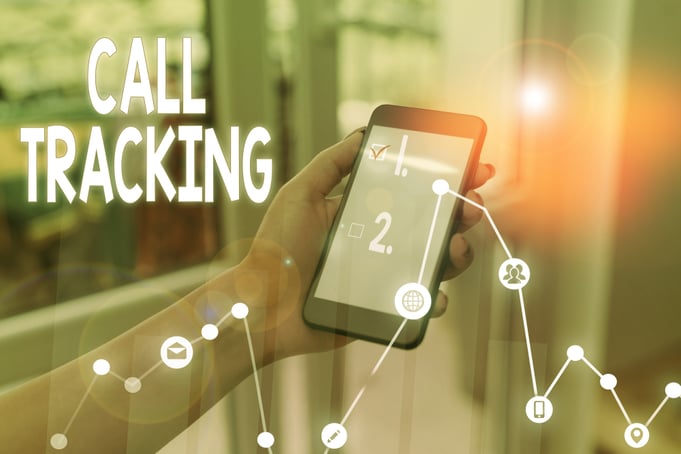When you hear the term “call tracking” you probably think of contact centers tracking communication between reps and leads. While this is a form of “call tracking,” it is different from the call tracking technology marketers use to optimize campaigns.
Call tracking software allows marketers to collect important data from phone conversations between customers and a business. This tracking system gives marketers the opportunity to understand the buyer's journey in greater detail as the software tracks how the customer came across a business and what steps drove them to make the call.
As the conversation between a potential customer/ customer and a business takes place, conversational analytics are then used to analyze the language used on the call as well as the conversion process. This data provides attribution for marketing campaigns and is strategically used to drive high-value leads to contact a business.
The above briefly defines call tracking technology, but how does the software actually work?

How Does Call Tracking Software Work?
Call tracking software is designed to capture information about leads who contact your business, and which marketing campaigns drove them to make the call. The data collected by a call tracking system varies and is dependent on your specific goals, budget and objectives.
Generally, a call tracking software is able to record and collect the following information:
- Number of calls you receive
- Where your callers are based
- When your callers contact your business
- Which marketing campaign drove the lead to contact your business
- Identify repeat callers
- Missed calls and where the calls came from
This insight is critical for marketers and helps them better understand the target audience and which marketing efforts are making a positive impact.
The above may have you believe that the process of call tracking is overly intricate and difficult to navigate however, call tracking systems are easy to use. They don’t require new equipment and will not impact your existing phone lines or phone numbers.
With the above in mind, how can you set up call tracking software for your business?
When you make the decision to set up a call tracking system there are three important decisions you need to make.
- Would you prefer a toll-free number or a local number?
- Where would you like your calls to be sent? That is: to a third-party call system, your marketing department, your sales representatives, or your office.
- Which marketing campaigns would you like to link the system to?
Once you have identified the above, it is time to begin the information-gathering process.
Every time a lead/customer calls your number, the phone call will be monitored and tracked. The system will collect a variety of information including the time of the call, when the call was answered, the location of the call and important information about the caller.
The data collected from call tracking isn't limited to simply pinpointing how a lead found your business, it also provides insight into the times people are making calls and how long it takes for a call to be picked up. This helps you streamline your marketing efforts as well as your internal processes, making for a better customer experience.
Without call tracking technology, it is almost impossible to comprehend when your clients are reaching out to your business, and a missed call can quickly equal a missed client. By streamlining the process of marketing and communication through data collection, you can guarantee client satisfaction and increased sales.
But, customer experience can be taken even further with call tracking personalization. Let’s take a look.
Personalized Caller Experience
The fact is, if a caller has a negative experience with your business, your conversion rates will plummet and your marketing investment will suffer. This is why it is vital you better the caller experience, as this ultimately increases your conversion rates.
As stated previously, call tracking can analyze important caller data however it can also retrieve real-time information about a caller. This will include their communication history with the business and the campaign that drove the original call. This gives your marketing or sales teams greater insight into the specific caller and their particular needs. This makes the caller feel heard and recognized by the business ultimately building brand trust. And it is brand trust that leads to loyal customers.
Call tracking software has the power to help your marketing and sales teams make informed decisions, better the customer experience and ultimately drive greater revenue for the business. And, who doesn't want that?
The Wrap Up
Today, technology has to be the marketing and sales person's best friend as it allows them to not only see valuable data that optimizes the sales process and save time but also provides access to the type of information that was almost unimaginable just a decade before.
One of the best sales-professional-friendly tools is Call tracking. Tracking technology can help a marketing or salesperson understand how invested a prospect is in the purchasing cycle. For example, how many times they have contacted your business, what product or service they are interested in, and how they came across your business. All of these things matter and data suggests that the more invested a prospect is in the sales process, the more likely they are to buy from you.
Call tacking measures all of these interactions and allows sales professionals to separate good quality, hot leads from those who haven't engaged in the process and are therefore unlikely to buy from you.
If you are interested in using Call Tracking for your business, or are looking for the best lead generation, lead scoring and lead conversion strategies, look no further than Nexa. Contact us today.
%20(1).png?width=2701&height=607&name=BRC_NEXA_LOGO_WHITE%20(2)%20(1).png)
